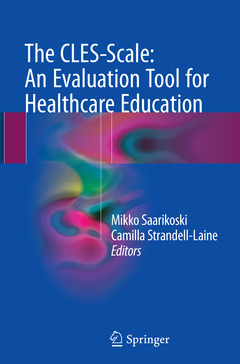Description
The CLES-Scale: An Evaluation Tool for Healthcare Education, Softcover reprint of the original 1st ed. 2018
Language: English
Subject for The CLES-Scale: An Evaluation Tool for Healthcare Education:
Publication date: 05-2018
Support: Print on demand
Publication date: 12-2017
Support: Print on demand
Description
/li>Contents
/li>Biography
/li>Comment
/li>
This contributed book is the first to focus on the Clinical Learning Environment and Supervision (CLES) framework. The origin instrument version of the CLES-scale has been published in Finland in 2002, and has generated wide European and International interest. The CLES network has pursued Europe-wide research. This book brings a unique perspective of students? clinical practicum in healthcare education and discusses how the national quality system can be used in the continual development of student supervisory systems. The book first presents the theoretical and practical principles of clinical learning, then defines the challenges of clinical learning for mentorship, clinical staff and nurse teachers. This volume also offers examples of the benefits and future perspectives of the CLES framework in healthcare education.
It is aimed at researchers and clinical professionals who contribute to students? clinical learning at universities and healthcare organisations. Itis especially suitable as a learning tool for clinical staff mentorship training courses and master?s level healthcare education studies.
Introduction and concept definitions.- Part I - Clinical learning environment - theoretical and practical principles.- 1. The main elements of clinical learning in healthcare education.- 2. Methodological issues and development process of the CLES scales.- 3. Country validation of the CLES-scale; linguistic and cultural perspectives.- 4. The CLES scale as a national quality tool for clinical learning and teaching.- Part II – Ensuring the high quality of a clinical learning environment.- 5. A good clinical learning environment as an organisational challenge.- 6. Empowering the professionalization of nurses trough mentorship: implementation of the CLES framework in an international project.- 7. Cooperation between the clinical staff and the clinical teacher.- Part III – The CLES framework - New perspectives and areas for development.- 8. How can patient relationships and patient experiences be better utilisedin student’s clinical learning?.- 9. New ways and environments of using the CLES framework.- 10. Possibilities of e-learning and new information technologies in clinical teaching.
Dr Mikko Saarikoski has been a nurse teacher in Finland since the 1980’s and a Research & Development Manager of Healthcare Education (2006-2010). His major work focused on researching and developing research instruments for quality assurance of clinical training of nursing students. Dr Saarikoski received his PhD in 2002 and his academic qualifications for a docent post have been accepted by the University of Turku in 2011. The area of his docent post is in Didactics of nursing science.
MNSc Camilla Strandell-Laine has a long experience as a nurse teacher at the bachelor’s degree level in nursing education especially as a clinical teacher supervising nursing students during the clinical practicum and educating mentors in student supervision. She also has teaching experience at master’s degree level. She is currently working as a Doctoral Candidate in the Doctoral Programme of Nursing Science in the University of Turku at the Department of Nursing Science. Her main research areas are mobile technology use in the supervisory process during the clinical practicum and clinical learning outcomes of nursing student.




